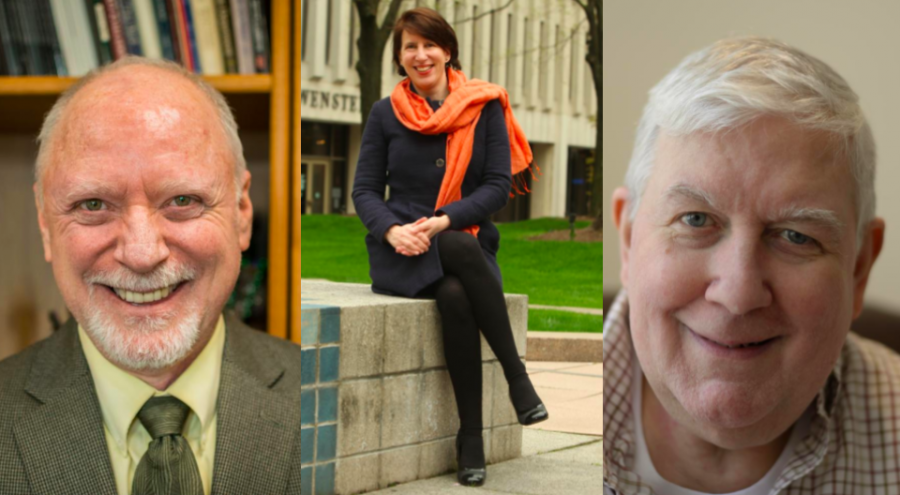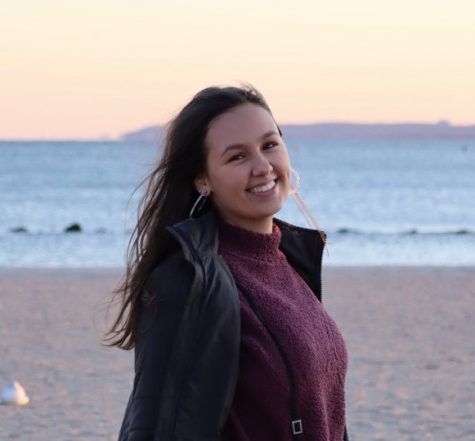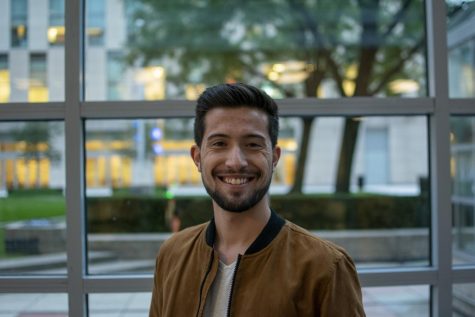FCLC Board of Advisors Disbanded
Behind Closed Doors: The Lasting Decisions Made in The Dean’s Office
ANDREW BEECHER/THE OBSERVER | TOM STOEKLER/FORDHAM NEWS | NIGEL ZWEIBROCK/THE OBSERVER
The Board assisted the Dean of FCLC in overseeing how the entire college was run. Dr. Wertz (left) served as interim dean after Fr. Grimes (right) stepped down due to a medical emergency. Last Spring, Dr. Auricchio (center) was appointed to the position.
October 16, 2019
Two nights before their quarterly meeting last April, the members of Fordham College at Lincoln Center (FCLC)’s secretive “Board of Advisors” — a group of influential FCLC alumni with ties to professional networks across New York City and the world — received an email from Interim Dean Frederick J. Wertz, tacitly announcing the Board’s termination. Since then, the 21 influential alumni who made up the Board’s members have been caught in a state of limbo, confused as to what their role at Fordham is, but passionate enough that they still want to be a part of it.
Wertz wrote to the Board via email on the night of April 9, 2019, explaining that this meeting was to be the last during his tenure as interim dean. While he did not specifically call for the Board’s termination in writing, he did state that “FCLC needs to reconstitute its Board within a new support organization in order to fulfill the needs of its students and rise to its current aspirations.”
Wertz clarified on the April 11 meeting that “reconstitute” meant a termination of the Board’s activities, effective at the end of that meeting.
According to the former Chairwoman of the Board of Advisors, Delia Peters, FCLC ’85, nearly every member of the Board was shocked to hear of its termination. Many were also offended by the way the decision was announced.
“Thinking about it now, I could say the way in which it was done was a little bit disrespectful,” said Peters. “I didn’t think of it in those terms at the time. I think I was too much in shock.” Peters said that several members of the Board did not even realize it had been terminated until they were told in person by Former Dean Wertz at the meeting on April 11.
Peters described the atmosphere on the day of the meeting as very tense. She remembered addressing the question of the Board’s future head-on with Wertz: “I said, let’s get it out right up front. Is this the last meeting of the Board of Advisors?’ He said yes. So there it was.”
Wertz explained that he chose to terminate the Board primarily to give the incoming dean of FCLC more flexibility to secure alumni donations.
“I wanted to tell the Board,” said Wertz, “without any implication that they were not appreciated, that we would be starting fresh and encouraging every one of them to get involved with the new dean.” The search for the new dean was still underway as late as April 26. Dean Auricchio’s appointment was announced on April 30.
“I was following the search [for the new Dean],” said Wertz. “Involved — to some extent — with it. Recognizing the potential of this college to go to the next level. To me, the next level means parity with Rose Hill; it means increased support for students.”
Dean Wertz indicated that he thought the Board’s structure and expectations were not in line with the fundraising goals he saw for the college, nor the expectations he held for the new dean.
“Now our Board had been very good with development; they’ve given gifts,” he said. “A lot of times their gifts were secret, it was sort of like anonymous and selfless and wonderful in the Fordham way. I think we’re entering a new era in Fordham, where we’re not being so modest, necessarily, but we’re also being more ambitious.”
He explained that he thought the needs of the university had changed since the Board was created. “They were formed in a time of turbulence, when the college and even the university was struggling to sustain and enhance itself,” he said. “Really in some ways, the termination of the Board of Advisors was kind of a consequence of their own success.”
Former Board member Nicholas Zennario, FCLC ’87, recalled his reaction to the university’s priority on fundraising that was expressed during the final Board meeting. “(Wertz) did say that whoever the new dean was… 40% of their time would be devoted to fundraising,” said Zennario. “My heart went out to whoever the new dean was going to be. Because that’s a tough task. It’s a really tough task.”
Peters expressed that a re-emphasis on the fundraising was never clearly communicated to the Board. “Nobody ever suggested that we should do things differently than we had been doing,” she said.
Wertz noted that the reaction to his decision was met with varied responses. “There were some members of the Board of Advisors who said this was great and supported the decision. There were others who weren’t as happy about it,” said Wertz. “I don’t want to be dismissive of any criticisms or any thought that what I did wasn’t right. On the other hand, I thought about it very hard.”
Zennario, who had called in by phone to the meeting, described the way he felt on the day the announcement was made. “I thought it was unusual,” he said. “That an interim dean would terminate a Board, especially one that’s been in existence for 31 years. But I accepted it. I accepted it. I tried to be a team player.”
While Peters was also sympathetic to the reasoning behind the decision, she admitted it was an unsettling new precedent. “I’ve been here for 31 years,” said Peters, “and this Board has worked with five different deans during that time period. Not one of the outgoing deans has ever dismissed the Board.”
Peters was also not entirely convinced that Wertz should have been able to disband the Board.
“I challenged his authority to do this,” said Peters. She recalled what she had said to Wertz during the meeting. “‘This Board was mandated into existence by Fr. O’Hare, the previous President of Fordham. You’re an interim dean. What gives you the authority to dismantle something that a President has put in place?’ No answer.” She also noted that her suggestion to put off a decision until after the new dean had met the Board was rejected. “That was it. There was no conversation and that was disturbing.”
Both Peters and Wertz noted that, despite its tense final meeting, the Board was honored at an alumni event over the summer. Peters explained that, to her, the ceremony made it seem as though the door had not fully been closed on the Board. Wertz was not present at the event.
Wertz was glad that the event took place, however. “I felt like we ended on a celebratory note when we honored the Board of Advisors in the reunion we had in June, and I’m hopeful that things are great for the college. This is actually the way I intended it. I wanted to give (the new dean) the time, space and freedom to think creatively and think outside of the box.”
The event was also an opportunity for Board members to honor the life of one of their peers. Shortly before the alumni reunion in June, one of the former members of the Board, Johnnie Planco, FCLC ’72, passed away.
University President, The Rev. Joseph M. McShane, S.J., admitted that some members of the university community had come to him with concerns since the decision was made. While he said he did “look into it,” he stated that it was a decision ultimately made independently of him.
“I’d like to trust the deans to do what they feel is right,” said McShane. “[Dean Wertz] used [the Board] to good effect but he said, ‘I think it makes sense for us to put a pause on this to give the new dean the opportunity to create her own Board.’”
McShane explained that each dean has their own advisory structures for their specific colleges. He clarified that he often removes himself from these Boards and allows the deans to oversee them as they see fit.
When asked specifically about Peters’ concerns, Dean Wertz clarified his position in an email. “My course of action was based on extensive reflection and consultation, including authentic dialogue with the Board,” he wrote. “My conviction remains that the decision I made is in the best interest of the College and Fordham.”
McShane was also clear that he trusted Dean Auricchio to make her own decisions moving forward. “If a new dean is smart, they’re going to be broadly consultative,” he said. “I think Auricchio is precisely that kind of person; really smart, very savvy.”
Dean Auricchio admitted that the Board was disbanded “before I got here.”
For now, her priority has been understanding the intricacies of her new position at FCLC, rather than implementing new changes. “I’ve been listening and learning,” she said. “I also firmly believe that we all do better when we all think together and that more perspectives are better than fewer. More input leads to better outcomes.”
Auricchio, however, was careful to state that she wanted to feel confident in understanding FCLC before implementing changes to it. “What I’m trying to do right now is just listen and learn,” she said. “Once I have a clearer sense of what Fordham’s needs and opportunities are,” she said, “then I think I’ll be able to turn my attention to the question of what type of support would best serve our goals.”
Dean Auricchio confirmed in an email that she will be meeting with Peters and another former Board member later this month.
McShane also indicated that he believed a “reconstituted” Board would be “up and running sooner rather than later.”
Yet Auricchio was clear that she did not feel comfortable reversing the decision to disband the Board so early in her tenure. “I know that I have a great deal to learn from them — and from alumni, students, faculty, and staff,” she wrote. “To be honest, my sense is that it would be a mistake for us to rush into decisions when I still have so much to learn.”
She was still looking forward to meeting with them, however. “Certainly the former Board members and I share the belief that FCLC is a special place with a critically important role at Fordham, and in higher education,” wrote Auricchio. “We also want to see FCLC and its community of students, scholars, and alumni thrive.”
When asked about the discontent expressed by some former members of the Board, Bob Howe, assistant vice president for communications, clarified the university’s official position in an email. “No insult was intended toward the former Board members, certainly,” he wrote. “The University deeply appreciates their service, and Dean Auricchio is making it a priority to draw on their experience and expertise in the near future.”
For his part, Dean Wertz was clear that he still held the former members of the Board in high regard. He expressed in his email “gratefulness for the contributions of the Board as a whole, my great appreciation of each Board member, and my confidence and enthusiasm about the future of the College with the leadership of Dean Auricchio.”
Zennario mentioned that the greatest difficulty for him was that he had not been informed of any of the University’s intentions. “I don’t know what the plan is,” he said. “I sit here knowing that … I guess I’m no longer a member of the Board of Advisors, because there is no Board of Advisors.”
Zennario said that he felt that many things about the Board were still up in the air. “If I have a bone to pick,” he said, “it’s simply this: Do we have closure? Are we turning the page? Please tell us. That’s all I ask.”
“Nobody has talked to me since that Board meeting in May — about my service going forward or otherwise,” said Zennario.
For her part, Peters noted that the shock of the announcement had since subsided into resolve. “All this being said about the shock value is basically water under the bridge at this point. It’s over. It’s been done,” she said. “But we love Fordham. We still want to contribute to it.”
She spoke to the attitude of the former members who consulted with her following the Board’s termination. “The general feeling is, yeah, this wasn’t very nice the way it was done, but we’d still like to be a part of Dean Auricchio’s Fordham. In any way that she thinks we can help. So we haven’t written off Fordham. It was just a shock.”
As for Zennario, he was still hopeful for the college’s future. “I look forward to at least speaking with the dean, if not meeting with the dean,” he said. “I am willing to work with her in any capacity that she thinks that I would be of use to the university. It would be just as much of an honor in 2019,” he said, “as it was in 1989, when I was first asked.”












